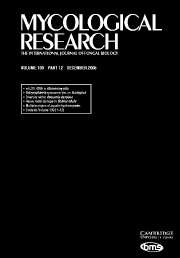Crossref Citations
This article has been cited by the following publications. This list is generated based on data provided by
Crossref.
Frazer, Lilyann Novak
1998.
One stop mycology.
Mycological Research,
Vol. 102,
Issue. 12,
p.
1571.
Zinjarde, Smita S.
and
Pant, Aditi
2000.
Crude oil degradation by free and immobilized cells ofYarrowia lipolyticaNCIM 3589.
Journal of Environmental Science and Health, Part A,
Vol. 35,
Issue. 5,
p.
755.
Chitnis, Manisha V.
and
Deshpande, Mukund V.
2002.
Isolation and regeneration of protoplasts from the yeast and mycelial form of the dimorphic zygomycete Benjaminiella poitrasii: Role of chitin metabolism for morphogenesis during regeneration.
Microbiological Research,
Vol. 157,
Issue. 1,
p.
29.
Oswal, N
Sarma, P.M
Zinjarde, S.S
and
Pant, A
2002.
Palm oil mill effluent treatment by a tropical marine yeast.
Bioresource Technology,
Vol. 85,
Issue. 1,
p.
35.
Papanikolaou, S.
Muniglia, L.
Chevalot, I.
Aggelis, G.
and
Marc, I.
2002.
Yarrowia lipolytica as a potential producer of citric acid from raw glycerol.
Journal of Applied Microbiology,
Vol. 92,
Issue. 4,
p.
737.
Zinjarde, S.S
and
Pant, A.A
2002.
Hydrocarbon degraders from tropical marine environments.
Marine Pollution Bulletin,
Vol. 44,
Issue. 2,
p.
118.
Bankar, Ashok V.
Kumar, Ameeta R.
and
Zinjarde, Smita S.
2009.
Environmental and industrial applications of Yarrowia lipolytica.
Applied Microbiology and Biotechnology,
Vol. 84,
Issue. 5,
p.
847.
Doiphode, N.
Joshi, C.
Ghormade, V.
and
Deshpande, M.V.
2009.
Yeast Biotechnology: Diversity and Applications.
p.
635.
Papanikolaou, Seraphim
Chatzifragkou, Afroditi
Fakas, Stylianos
Galiotou‐Panayotou, Maria
Komaitis, Michael
Nicaud, Jean‐Marc
and
Aggelis, George
2009.
Biosynthesis of lipids and organic acids by Yarrowia lipolytica strains cultivated on glucose.
European Journal of Lipid Science and Technology,
Vol. 111,
Issue. 12,
p.
1221.
Papanikolaou, Seraphim
and
Aggelis, George
2010.
Yarrowia lipolytica: A model microorganism used for the production of tailor‐made lipids.
European Journal of Lipid Science and Technology,
Vol. 112,
Issue. 6,
p.
639.
Buddie, A.G.
Bridge, P.D.
Kelley, J.
and
Ryan, M.J.
2011.
Candida keroseneae sp. nov., a novel contaminant of aviation kerosene.
Letters in Applied Microbiology,
Vol. 52,
Issue. 1,
p.
70.
Rywińska, Anita
Musiał, Izabela
Rymowicz, Waldemar
Żarowska, Barbara
and
Boruczkowski, Tomasz
2012.
EFFECT OF AGITATION AND AERATION ON THE CITRIC ACID PRODUCTION BYYarrowia lipolyticaGROWN ON GLYCEROL.
Preparative Biochemistry and Biotechnology,
Vol. 42,
Issue. 3,
p.
279.
Hassanshahian, Mehdi
Tebyanian, Hamid
and
Cappello, Simone
2012.
Isolation and characterization of two crude oil-degrading yeast strains, Yarrowia lipolytica PG-20 and PG-32, from the Persian Gulf.
Marine Pollution Bulletin,
Vol. 64,
Issue. 7,
p.
1386.
Kar, Tambi
Destain, Jacqueline
Thonart, Philippe
and
Delvigne, Frank
2012.
Physical and physiological impacts of different foam control strategies during a process involving hydrophobic substrate for the lipase production by Yarrowia lipolytica.
Bioprocess and Biosystems Engineering,
Vol. 35,
Issue. 4,
p.
483.
Kulkarni, S. V.
Palande, A. S.
and
Deshpande, M. V.
2012.
Microorganisms in Environmental Management.
p.
589.
Darvishi Harzevili, Farshad
2014.
Biotechnological Applications of the Yeast Yarrowia lipolytica.
p.
17.
Zinjarde, Smita
Apte, Mugdha
Mohite, Pallavi
and
Kumar, Ameeta Ravi
2014.
Yarrowia lipolytica and pollutants: Interactions and applications.
Biotechnology Advances,
Vol. 32,
Issue. 5,
p.
920.
Bellou, Stamatia
Makri, Anna
Triantaphyllidou, Irene-Eva
Papanikolaou, Seraphim
and
Aggelis, George
2014.
Morphological and metabolic shifts of Yarrowia lipolytica induced by alteration of the dissolved oxygen concentration in the growth environment.
Microbiology,
Vol. 160,
Issue. 4,
p.
807.
Palande, A. S.
Kulkarni, S. V.
León-Ramirez, C.
Campos-Góngora, E.
Ruiz-Herrera, J.
and
Deshpande, M. V.
2014.
Dimorphism and hydrocarbon metabolism in Yarrowia lipolytica var. indica.
Archives of Microbiology,
Vol. 196,
Issue. 8,
p.
545.
Sekova, V. Yu.
Isakova, E. P.
and
Deryabina, Yu. I.
2015.
Biotechnological applications of the extremophilic yeast Yarrowia lipolytica (review).
Applied Biochemistry and Microbiology,
Vol. 51,
Issue. 3,
p.
278.




